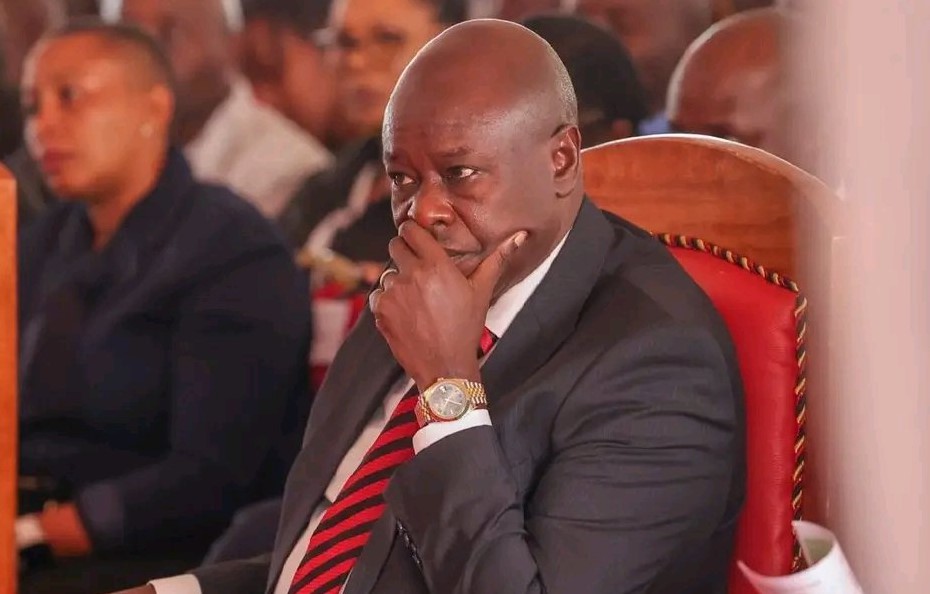Court upholds dismissal of Gachagua’s staff after impeachment

The judge ruled that the government did not violate the constitutional rights of the affected employees.
The Employment and Labour Relations Court in Nairobi has upheld the dismissal of staff who served under former Deputy President Rigathi Gachagua, following his impeachment in October 2024.
In a judgment delivered by Justice Hellen Wasilwa, the court dismissed a petition filed by Nairobi-based lawyer Suyianka Lempaa and the African Centre for Peace and Human Rights, which had challenged the legality of the mass termination.
More To Read
- Gachagua rejects Raila’s dialogue proposal, calls for "ballot-based change" in 2027
- Two Gachagua allies, 34 others charged over attacks on government offices in Kikuyu, Matuu
- Gachagua unveils 8-point plan to end protests, slams Ruto over housing levy, police brutality
- Gachagua to Ruto: Nobody wants to overthrow you, let's meet at the ballot
- DPP links Gachagua associates to coordinated terror attack on Kikuyu government offices
- Gachagua dismisses Ruto's "coup plot" claims as fiction, blames government for protest chaos
The judge ruled that the government did not violate the constitutional rights of the affected employees.
The petitioners had argued that the dismissals preceded by compulsory leave were politically motivated and undermined the neutrality of the civil service. They contended that civil servants should not lose their jobs simply because the political figure they served was removed from office.
“The civil servants should not be the grass that suffers when most political giants lock horns,” Lempaa told the court.
He further asserted that the roles of government employees are not tied to the individuals in office, but to the institutions themselves.
“The court should take judicial notice that the office holders of the Prime Cabinet Secretary and Deputy President can change at any time. Therefore, tying the fate of any public officer to the life or fate of another human being and not office is in violation of their right to fair labour practices under Article 41 of the Constitution,” Lempaa argued.
However, Justice Wasilwa found no merit in the petitioners’ claims. She noted that, apart from those employed on permanent and pensionable terms, the dismissed staff were serving on contract terms specifically tied to Gachagua’s tenure.
“It is clear that the said 61 officers were employed on local agreement terms with a provision that the contract was pegged to the tenure of office of the Deputy President Rigathi Gachagua, who has since been impeached as per the evidence adduced,” said the judge.
She added that the employees had signed agreements acknowledging their service was bound to the term of the Deputy President, and therefore could not claim unfair dismissal after his exit.
“The staff signed the agreement agreeing to serve during the tenure of the former Deputy President, and therefore they cannot derogate from this fact,” she ruled.
Justice Wasilwa also pointed out that the contracts presented in court lacked sufficient clarity to support claims of unlawful termination.
“I do not find any constitutional infringements meted out against the officers who served in the office of the former Deputy President, and therefore, the orders sought cannot be granted as prayed. The entire petition lacks merit and is hereby dismissed,” she concluded.
The petitioners had also challenged the legality of placing the staff on compulsory leave immediately after Gachagua’s impeachment, terming it unjustified and discriminatory.
“The civil service owes its loyalty to the government of the day, irrespective of the political party or politician in power, and the civil service should avoid creating the impression of political bias. The anonymity and neutrality of the civil service are reinforced by rules restricting political activity,” Lempaa maintained.
But the court agreed with the submissions of the Public Service Commission (PSC) and the Attorney-General, who stated that the contract-based staff at the Deputy President’s office serve at the pleasure of the officeholder and their terms automatically lapse once the holder exits office.
PSC Secretary and CEO Paul Famba emphasised that the Commission had no role in the decision to place the officers on compulsory leave, and clarified the distinction between contract and permanent employees.
“Staff employed on permanent and pensionable terms cannot be removed from office due to a change in leadership, as they serve the government of the day,” Famba said. He noted that the contracts of those serving on a temporary basis ended automatically on October 17, 2024, the date of Gachagua’s impeachment.
“Hence, the said officers cannot proceed on any form of leave, least of all compulsory leave,” he added, emphasising that only permanent staff should have resumed duty, while the contracts of others had lawfully lapsed.
Top Stories Today











































